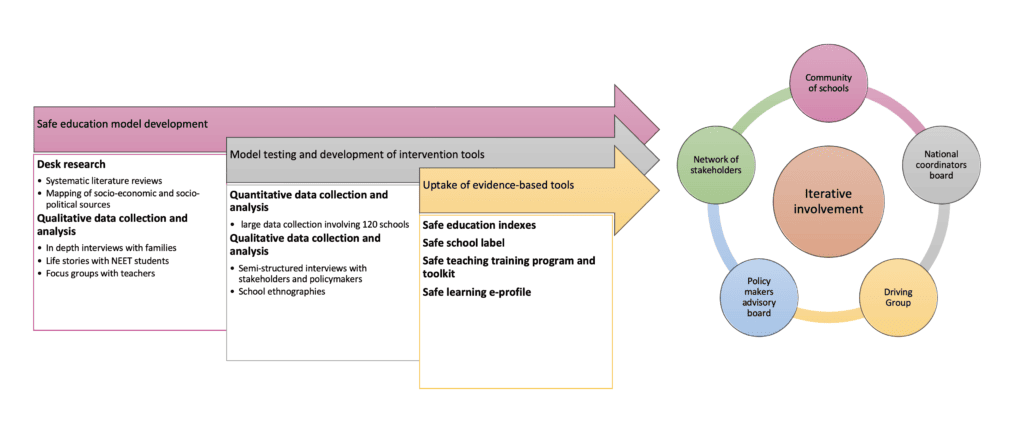APPROACH
Our project has an applied and child-centred approach based upon attachment theory, the bioecological model of human development and inclusive education theories. We explore how relational variables influence student’s socio-emotional security to enhance the academic and learning success.
From early childhood education to secondary education, we focus on four levels of intervention to tackle educational achievement, engagement, and early school leaving:
Pillar 1 Individual level – Safe learning
Caregiving enables children’s positive development by delivering stimulation, support, safety, and protection. Secure attachment relationships with caregivers provide children with the opportunities and resources to learn and grow. This level focuses on safe learning and how children´s closest bonds promote their socio-emotional development and enhance their educational achievement, engagement, and overall well-being.
Pillar 2 Relational level – Safe teaching
Teachers play a key role in encouraging children’s learning and supporting their social and personal development. Education has a transformative potential that nurtures, amongst others, children’s implication in gaining knowledge, skills and reaching healthy personal and social development. This level focuses on safe teaching and how cultivating positive teacher-student relationships, as they are essential for supporting individualised learning, promoting academic achievement and educational engagement, and empowering students to profit from all educational opportunities within their reach.
Pillar 3 Community level – Safe school
Educational communities are networks that address and support meeting children’s learning and developmental needs. Schools are responsive environments in which the management and organisation of resources, are aimed at promoting children’s educational outcomes. This level focuses on safe schools, and how promoting children’s sense of belonging to the school community and cultivating positive school climates children can attain higher levels of educational achievement and engagement, alleviating early school leaving.
Pillar 4 Policy level – Safe education
Educational policies shape the kind of educational environments in which children develop by establishing a framework and strategic targets that influence the educational practice. This level focuses on safe education and how educational systems facilitate the process of learning and teaching by promoting measures and practices that shape educational experiences, improve educational achievement and engagement, tackle early school leaving, and finally impact educational inclusion.
METHODOLOGIES
Our methodological approach is based on the premise that interaction and exchange among people produces valid knowledge. Co-creation means to actively participate in research involving multiple stakeholders’ perspectives and experiences. Our co-creation approach applies mixed-methods techniques that focus on active engagement, collaboration, and dialogic reflection among all the key stakeholders involved in education and the project implementation.

